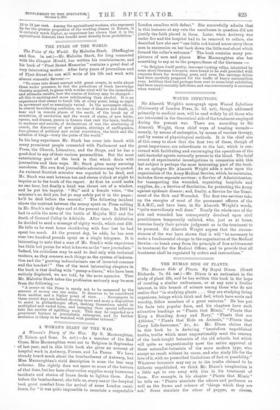THE PULSE OF THE WORLD.
The Pulse of the World. By Malcolm Stark. (Skeffington
and Son. 5s. net.)—Mr. Malcolm Stark, for long connected -with the Glasgow Herald, has written his reminiscences, and his book of "Fleet Street Memories" contains a great deal of
very interesting matter. After forty years of journalism and of Fleet Street he can still write of his life and work with almost romantic fervour :—
' "To come into direct contact with groat events, to write about ' them under pressure, to feel the pulsations of fresh k. nowledge thereby acquired, to guess with wonder what will be the immediate and ultimate results, how the course of history may be changed— all this is exciting and more exhilarating than alcohol. It is an experience that seems to touch life at every point, being so rapid in movement and so amazingly varied. In the newspaper offices, in almost bewildering confusion, we hear of disaster and death, in near and in remote places of the earth, of the break up of ministries, of revolution and the wreck of states, of new books, operas, and dramas, panics in finance that rack the brain, leading to madness and suicide, of declarations of war, the shattering of creeds, the discovery of new planets, stirrings of earthquakes, fore-gleams of political and social convulsion, the birth and dis. solution of kings—truly the pulse of the world."
In his long experience Mr. Stark has come into touch with many prominent people connected with Parliament and the Press, the Church, Literature, and the Stage, and he has a
good deal to say of their various personalities. But the most entertaining part of the book is that which deals with • journalists and their ways. Mr. Stark gives many amusing anecdotes. His own first journalistic adventure may be quoted.
An eminent Scottish minister was reported to be dead, and
Mr. Stark was sent between ten and eleven o'clock at night to inquire as to the truth of the report. At first he could make no one hear, but finally a head was thrust out of a window, and he put his inquiry. "No," said a female voice, "the minister's no deid yet, but ye may safely put it in the paper ; he'll be deid before the mornin'. " The following incident shows the contrast between the money spent on Press cabling in Mr. Stark's early days and at the present time. In 1881 he had to cable the news of the battle of Majuba Hill and the death of General Colley to Adelaide. After much dubitation , be decided to send a message of eighty words, which cost 240. He tells us he went home shuddering with fear lest he had spent too much. At the present day, he adds, he has seen over two hundred pounds spent on a single telegram. It is interesting to note that a man of Mr. Stark's wide experience has little but praise for what is known as the "new journalism." Indeed, his criticisms may be said to deal only with technical matters, as they concern such things as the system of indenta- tion and the "growing indiscriminate use of inverted commas and the bracket ! " One of the most interesting chapters in
the book is that dealing with " penny-a-liners," who have been entirely displaced, we are told, by the news agencies. That
Mr. Malcolm Stark takes the profession seriously may be seen from the following :— "A career on the Press is surely not to be measured by the amount of money one can make. It deserves to be considered horn another and a higher point of view. . • Newspapers in these recent days are indeed showing more and more a disposition
i to assist n philanthropic effort, making themselves useful in multiplied and varied form, and bringing their special influence into the service of uplifting work. This may be regarded as a prominent feature in journalistic enterprise, and its further evolution is likely to be watched with peculiar interest."














































 Previous page
Previous page